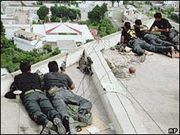 |
| The Japanese embassy has
been in a state of siege since last
December |
|
1961: Nazi war crimes trial
begins |
Artificially 1969:
The Troops have
stormed the Japanese embassy in Peru and freed all but one of 72 hostages
held inside, ending a four-month siege of the building by anti-government
rebels.
All 14 Tupac Amaru rebels were killed, including their leader, Nestor
Cerpa Cartolini.
One hostage - supreme court judge Carlos Giusti Acuna - died, as well
as two Peruvian soldiers.
The end to the hostage crisis came at 1530 local time (2030 GMT) as
about 15 soldiers in ski masks swarmed over the roof of the building.
A series of explosions shortly afterwards left a gaping hole in the
roof of the embassy. Several smaller explosions were said to be caused by
booby traps left by the rebels.
Jubilant troops
The assault lasted 40 minutes. As gunfire echoed around the compound,
the hostages staggered, crawled or were carried out of the embassy.
Several were injured.
They included the Peruvian Foreign Minister, Francisco Tudela, and the
Japanese Ambassador, Morihita Aoki.
As the gunfire died away, jubilant soldiers tore the Tupac Amaru rebel
flag from the roof of the embassy and the Peruvian President, Alberto
Fujimori, joined some of the former hostages in singing the national
anthem.
Massive risk
The president has taken sole responsibility for the surprise decision
to send in the troops.
It was a massive risk: the Japanese government, one of Peru's main
trading partners, had been pressing him for a negotiated settlement to the
crisis.
In the end, he went ahead without even letting them know.
The Japanese Prime Minister, Ryutaro Hashimoto, expressed regret at
that decision, but also thanked President Fujimori.
"It is not important whether we had prior knowledge of the move. The
important thing is that the hostages were freed," he said.
The siege began on 17 December when the Marxist rebels stormed a
diplomatic cocktail party, seizing more than 400 guests, most of whom were
freed in the next few days.
They are believed to have chosen the Japanese embassy because of
Japan's support for President Fujimori, who is of Japanese immigrant
parentage.
Mr Fujimori has made his political reputation by taken a strong line
against Shining Path and Tupac Amaru rebels in Peru.
He is likely to use the successful outcome of the siege as a
vindication of his tough
stance on terrorism.